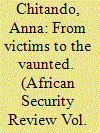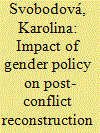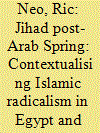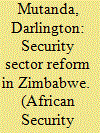|
|
|
Sort Order |
|
|
|
Items / Page
|
|
|
|
|
|
|
| Srl | Item |
| 1 |
ID:
170254


|
|
|
|
|
| Summary/Abstract |
Reflecting on young women involved in violence/peace, the dominant views present them as victims. This is understandable, as young women constitute the majority of those who are at the receiving end of violence. Further, young people are generally regarded as a threat. However, this paradigm glosses over the contribution of young women to peacebuilding in their communities. Despite the UN Security Council Resolution 1325 calling for women’s equal participation and full involvement in all efforts for the maintenance and promotion of peace and security, major challenges of its implementation in Africa remain. Therefore, this study sought to establish young women’s understanding of peacebuilding, activities they undertook to contribute to peacebuilding in Mashonaland East in Zimbabwe, and the challenges they encounter. The study prioritised the agency of young women in contributing towards peace in Mashonaland East, Zimbabwe. The research was based on the qualitative method as it sought to establish how women participate in peacebuilding. Findings of the study showed that young women are contributing to peacebuilding, although they face some challenges.
|
|
|
|
|
|
|
|
|
|
|
|
|
|
|
|
| 2 |
ID:
170255


|
|
|
|
|
| Summary/Abstract |
The article analyses the relation between security and enhanced women’s participation in political, legal, and social matters in Rwanda after the genocide. Rwanda serves as a unique example of the fast empowerment of women in a developing state and hence as a model sui generis for investigating connections between greater female participation in post-conflict reconstruction and an improving security situation. The analysis consists of three research questions which examine the results achieved by women in legislation, civil society, and the judiciary, and their impact on the improvement of security in Rwanda.
|
|
|
|
|
|
|
|
|
|
|
|
|
|
|
|
| 3 |
ID:
170253


|
|
|
|
|
| Summary/Abstract |
This article examines the rise in jihadi activity within North Africa in recent years and aims to answer two fundamental questions: first, how have local and foreign jihadi groups capitalised on the unique domestic contexts in Tunisia and Egypt in the aftermath of the Arab Spring revolutions to advance their insurgencies? Next, what are the key factors conducive to extremism in both countries that have facilitated this? This study highlights the importance of contending with extremism with respect to the differentiated socio-historical, political and economic circumstances of each country. From a broader perspective, several trends common in the rise of extremism in both countries are identified. First, there is a tendency of extremism to consolidate in proportion to the amount of institutional void. Next, conditions of poverty often supply futile ground for the entrenchment of terrorism; in particular, the study highlights on how jihadi groups have made a concerted effort to damage the economic interests of each country. Finally, the presence of historical grievances provides a conducive environment for extremism. In light of the threat of cell dispersion following the recent defeats faced by ISIS in Syria and Iraq, an understanding of jihadi operations in North Africa becomes increasingly crucial.
|
|
|
|
|
|
|
|
|
|
|
|
|
|
|
|
| 4 |
ID:
170256


|
|
|
|
|
| Summary/Abstract |
Studies on security sector reform in Zimbabwe have largely taken the radical view that more often than not, the military has acted undemocratically through uttering and overseeing an array of operations meant to stifle democracy. Using document analysis, this article argues that police reform in Zimbabwe is imperative in ensuring the safety of the citizens who have since 1980 fallen victim to police unprofessionalism. There is sufficient evidence to suggest that any insightful discussion on security sector reform in Zimbabwe should take into account the role police have occupied in propping up ZANU PF since independence in 1980. Notwithstanding the volatile political environment that prevailed, it is the argument of this paper that the police were central to the survival of ZANU PF through the systematic execution of violence against the opposition; ignoring cases of political violence brought to them or even the ones they witnessed; carrying out politically-motivated arrests and dismissing alleged anti-ZANU PF police officers. It is therefore significant for Zimbabwe to speed up efforts to train and equip the police force with the requisite skills and weaponry so that they execute their duties within the confines of the country’s constitution.
|
|
|
|
|
|
|
|
|
|
|
|
|
|
|
|
| 5 |
ID:
172325


|
|
|
|
|
| Summary/Abstract |
To date, two power-sharing agreements have been signed since civil war broke out in South Sudan in December 2013. The first agreement collapsed just after one year when renewed fighting broke out in July 2016. The second agreement signed in September 2018 continues to experience implementation challenges and ceasefire violations, while some of the parties declined to sign it. This article explores the role of distrust in stagnating the power-sharing agreements, and how trust building could be a game-changer. In a semi-structured in-depth interview, 29 key stakeholders were interviewed, including the conflict parties, mediators, eminent South Sudanese personalities, scholars and civil society leaders. Five major themes emerged: historical conflicts, estranged political relationships, power struggles, resource control and ethnic violence (not included in this article). The results suggest the conflict is sustained by a trust deficit among the parties arising from unresolved historical conflicts to estranged political relationships and power struggles. The article recommends transitional justice approaches for trust building and sustainable agreements.
|
|
|
|
|
|
|
|
|
|
|
|
|
|
|
|
|
|
|
|
|